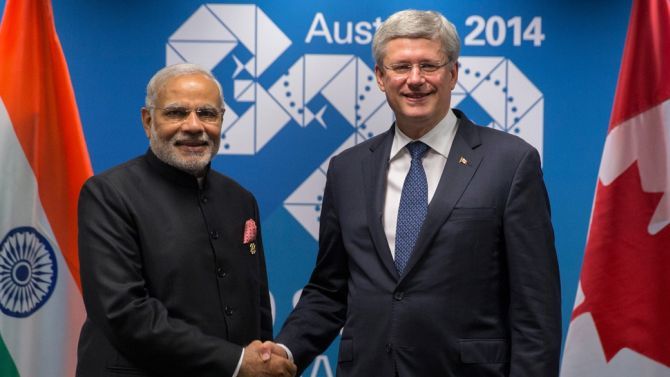
'Notwithstanding the physical distance, the two countries historically had a convergence of approach and outlook to many international issues.'
'The relationship between the two countries cannot develop or flourish in a vacuum. There should be initiatives at various levels -- at the level of government, Parliament and the people,' says Rup Narayan Das.
Prime Minister Narendra Modi's three-day visit to Canada offers both countries a great opportunity to transform the strategic relationship between them to greater heights. Although then prime minister Dr. Manmohan Singh had visited Canada in June 2010 to participate in the G-20 summit, the present visit is the first standalone meeting in the last 42 years.
Modi met Canadian Prime Minister Stephen Harper in Brisbane on the sidelines of the G-20 meeting in November. A standalone visit by the Indian prime minister was long overdue, more particularly in the context of the formation of the new government enjoying an absolute majority in Parliament.
India's rising global profile as the world's fastest growing economy also augurs well for a comprehensive engagement between the two democracies practicing federalism and multi-culturalism, and at times nuances of coalition politics.
The presence of a dynamic Indian Diaspora constituting about 1.2 million adds flavour to the mosaic of this robust relationship. It is unfortunate that this relationship has suffered benign neglect in the past and its potential has not been realised.
Notwithstanding the physical distance, the two countries historically had a convergence of approach and outlook to many international issues. It is worth recalling that in the first decades after Indian Independence in 1947, the two countries had what is called a 'special relationship.'
Although Canada is a liberal democracy and India opted for a socialistic pattern of society in the nascent years of Independence, the liberalism of the two countries, have much in common than divergence. Canada was not averse to socialism. In fact, there was a perceptible resonance between India's formulation of non-alignment and Canada's commitment to neutrality in international relations in spite of its membership of NATO.
According to Arthur Rubinoff, an acknowledged authority on Indo-Canadian relations, in the early years after Indian Independence, there was a fundamental convergence in the approach to world affairs between New Delhi and Ottawa on issues like the Commonwealth, the United Nations and the situation in Asia.
The Commonwealth provided and continues to provide an ideal forum for Canada and India to work in creating, what Rubinoff calls, an international grouping that served as a bridge between the established Western democracies and the new multiracial successor States of the British empire.
In the 1950s, Canada was an important development partner for India for many years even in sensitive areas like nuclear energy. In fact the Rajasthan Atomic Power Station I & II are dependent to a large extent on supply of uranium from Canada. However, estrangement in the bilateral relationship developed later, first after India's peaceful nuclear tests of 1974, and then again after the Indian nuclear tests of May 1998 which impelled Ottawa to suspend the supply of uranium to RAPS.
Slowly, the relationship between the two counties started improving. The visit of the Canadian Prime Minister Jean Chretien, to India in October 2003 was a landmark event in the bilateral relationship between the two countries. In their joint statement both countries announced an India-Canada Partnership for the 21st century at the government, business and civil society levels, spelling out the future road-map for India-Canada relations.
India is one of the most promising new emerging markets acknowledged by Canada as being of strategic importance. The rediscovery of India by Canada was the result of the economic reforms and liberation process initiated by India in July 1991, the end of the Cold War, the realisation that Canada should expand its economic engagement in markets other than that of the United States.
As a consequence, Canadian companies now enjoy increasing success in India in traditional areas of Canadian expertise like power, communications and transportation and new areas like environmental technology and ago-processed items. With the signing of the nuclear deal, it is possible to explore further nuclear cooperation between the two countries.
In fact, the Cameco Corporation of Canada, (the largest supplier of uranium) has already made it clear that India can place order for uranium anytime and India can also stockpile it. It is likely that two sides will clinch a deal for the commercial supply of uranium from Canada during Modi's visit.
The relationship between the two countries cannot develop or flourish in a vacuum. There should be initiatives at various levels -- at the level of government, Parliament and the people. A climate of understanding, awareness and appreciation needs to be created at the civil society level by the intelligentsia, the media and academia. India's inclusive global engagement provides enough space for an engagement with Canada.
What is required is an initiative. The two countries being leading members of the Commonwealth and of the Colombo Plan can utilise these fora to forge a bonding with the Afro-Asian countries. Leaders of the two countries should also avail and utilise the Commonwealth platform to share and exchange views on regional and international issues.
Members of the Canadian parliament of Indian origin belonging to both the Conservative and Liberal parties can play an important role to further the bilateral relations between the two countries.
Image: Prime Minister Narendra Modi and Canadian Prime Minister Stephen Harper on the sidelines of the G-20 summit in Brisbane, Australia.
Rup Narayan Das is a Director in the Research and Information Division at the Lok Sabha Secretariat.










